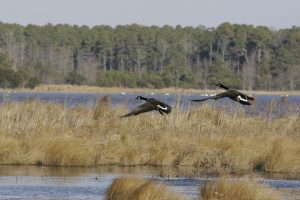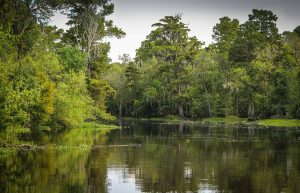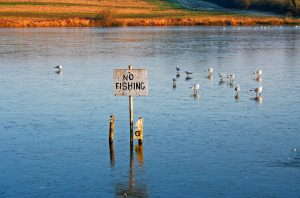In the face of population pressure, urbanization and development have you ever asked yourself Why Protect Wetlands ? Surely those swamps would be better used to house people after all.

Canadian-Geese
Unfortunately that has been a commonly held opinion for far too long. Now population pressure, and developer’s lobbyists are putting increasing pressure on precious wetlands.
This is partly because property developers challenge local authorities and also ask Why Protect Wetlands. But they have a different emphasis, and a lot of money behind them.
How do you convince a developer that the ecosystem of the wetland is more important than a multi-million dollar resort project?
Wetlands, those untidy looking marshes, play a crucial role in the environment. They generally form a part of a large interdependent system in the local ecology. This means that destruction of the wetland will have far reaching effects beyond the wetland itself.
It will start domino-effect that is going to have an impact on everybody.
Wetlands vary in nature from region to region. Broadly they include riverbanks, marshes, swamps and bogs among many others. They even include the old rice fields in some cases.
One of the most important qualities of the wetlands is that they contain very rich diversity. Whether in the Florida everglades or the Australian wetlands, numerous plants, as well as animal biodiversity on the planet depends on the preservation of these wetlands.
When wetlands are destroyed, the result could be an increase in human-wildlife conflict in the areas affected. No one wants to encounter large lizards, alligators or pythons in their backyards, but that could be the result if there is ongoing destruction of natural habitats. The result of these encounters can be potentially deadly.
But its not only the potentially fatal consequences of human wildlife encounters. Remember we also said that these features form part of an interdependent ecological system. For example, they will feed the downstream rivers and streams. These also play an important ecological function such as supplying us with water or ensuring there is good quality water flowing downstream.

Protected Bayou Waterway
They also serve as reservoirs for flood waters which could otherwise cause damage in communities and neighborhoods totaling millions of dollars.
The wetlands also help in replenishing the ground water supplies and help in eliminating pollution. Even social anglers have a stake in wetlands, as they serve as the habitats and breeding grounds for local fish populations.
In many cases, wetlands and adjoining waterways will also be a major driver of the local economy. Not only do they support recreation such as fishing and boating, but eco-tourism attracts people and pumps money and jobs into the community.
So, Why Protect Wetlands?
Those are some of the ecological, economic and social values that the wetlands provide to the local geography and economy. They should not just be seen as a marginal or unproductive piece of land that is begging for “development”.
Importance for water quality
Water is life and wetlands play a crucial role in ensuring we have a stable and quality water supply. In fact, the primary “selfish” reason we should protect the wetlands is that they help in ensuring good water quality. Healthy wetlands are rich in plant and animal life and these provide natural filtration systems ensuring water coming out of this ecosystem is of excellent quality and free of chemicals.

Fish Breeding Ground
Protection of Wetlands
Municipal authorities should , by now, be well past asking Why Protect Wetlands. They should be part of the solution with low impact, sensible policies.
In some places, local authorities do protect these valuable resources by offering developers incentives to give up the wetlands for conservation purposes.
Authorities can also pass laws that will restrict activities that are likely to lead to the destruction of the wetlands. Local resident advocacy by aware citizens can also be highly effective in ensuring the wetlands and habitats are well preserved for posterity.
